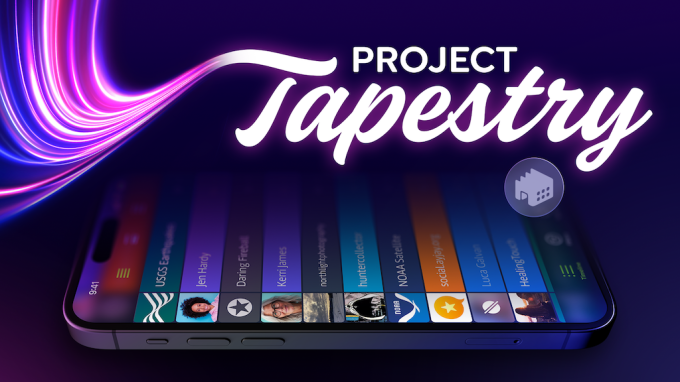2023 was the year social networks realized that they were sitting on massive troves of data. And some companies, such as Twitter (now X) and Reddit, decided to change their terms to shut out third-party experiences on these platforms. In the process, they also put a price on their data — something they believe is highly valuable today as it can be used to train AI models.
After talking to several third-party developers who built apps and services on top of these larger social networks, we learned that there are mixed feelings among the developers about building experiences around social networks. While they are excited about the rise of decentralized networks, some of them haven’t seen enough incentives to build out new apps.
The APIcalypse
Twitter has historically been one of the most popular social networks when it comes to third-party apps. Some of those apps even pre-date the name “tweet.” In January, however, the company started to shut out these clients without any notice. Within days, in typical Elon Musk style, the social network silently changed its developer terms to effectively shut down third-party apps.

In the following months, the company shuttered free access to its API and raised prices for other tiers. These new prices and limitations were so high that some third-party experiences, such as automatic alert posting services and research, suffered alongside the third-party clients. It only made sense to develop a paid application for teams and enterprises to bear costs as high as $42,000 per month for enterprise-tier access.
In contrast, Reddit gave notice to developers about changing its API terms in April. However, in May, Christian Selig, the developer of the popular iOS client Apollo, had a call with the company where he learned that the cost demanded by the platform was so high that his app would go out of business. Following that news, many subreddits staged blackouts in protest. Reddit CEO Steve Huffman gave multiple interviews defending the changes made by the company and Reddit started forcing rebel moderators out by removing them from moderator posts.

As Reddit implemented its API changes, many apps, including Apollo, RIF (Reddit is Fun), ReddPlanet, Sync and BaconReader shut down. Some apps like Narwhal remained available with a subscription model, while RedReader, Dystopia and Luna were exempted from API changes because they provided accessibility features without any commercialization.
Narwhal developer Rick Harrison, who is also the co-founder and CTO of YC-backed dispensary software Meadow, told TechCrunch that he plans to maintain his Reddit client.
“I have continued developing this app because I primarily make this app for myself. I originally made Narwhal before Reddit even had an app and I wanted one for my daily commute. Now, I continue working on it as a side project, because I find it fun, and I have a small community of users who also enjoy the app,” he said.
On the other hand, Selig, who had to stop the development of the more popular Reddit client Apollo, isn’t bullish on continued collaboration between social media companies and developers. He calls that era “a bit of a distant memory.”
“The challenges and the severity of them depend on the host platform and their willingness to have developers on their platform, within those constraints, things can go either very smoothly or with great difficulty,” Selig said.
“For instance with Reddit, at the beginning, they were very communicative with developers and the development of the API, however in recent years they instead chose to use a different API internally and no longer use the ‘traditional’ API that developers depended on, which meant it was effectively left to languish with bugs and missing features.”
Industry observers noted that social networks have gradually closed down their platforms for third-party apps. Tom Coates, the co-founder of an older decentralized app called Planetary, told TechCrunch that social apps were open to allow third-party experiences in the early days of the social web, but over time, platforms like Instagram have proved that closed ecosystems are beneficial.
“Other platforms have been a bit more reliable, but the early spirit of trying to grow the whole ecosystem and to become a good citizen in a wider environment has kind of gone from the corporate social world,” he said.
Social networks want to protect their data from AI
Both Reddit and Twitter put restrictions on their APIs to better monetize the data of their social networks. Apart from introducing new limits on APIs, Musk also limited the number of posts in July 2023 users can view in a day as a measure to “address extreme levels of data scraping.”
Last September, the company updated its policy to ban scraping and crawling. Plus, the updated policy allowed X to train AI models through public data. In November, Musk’s new AI company called xAI launched Grok, an AI chatbot, to leverage that data. Later in December, subscribers of X’s highest-paid tier Premium+ got access to this chatbot.
Reddit also put gates around its data to stop AI companies from using it to train models. In an interview with The New York Times in April, CEO Steven Huffman said that companies need to pay to use Reddit’s data — something that’s valuable not only to AI companies like OpenAI, but also Google Search, which users in recent years have been hacking to get less spammy results by adding “reddit” to their search queries.
“The Reddit corpus of data is really valuable,” Huffman told The NYT. “But we don’t need to give all of that value to some of the largest companies in the world for free,” he said.

Weeks later, when Reddit was at a crossroads with third-party developers, in an interview with The Verge, the CEO of Reddit said that the social network’s API was never meant to support third-party clients.
“[Reddit’s API] was never designed to support third-party apps. We let it exist. And I should take the blame for that because I was the guy arguing for that for a long time. But I didn’t know — and this is my fault — the extent that they were profiting off of our API. That these were not charities,” he noted.
The new wave of social networks
The change in guard at X/Twitter gave birth to new social networks like Bluesky, Spill, Pebble (now discontinued), Post and Meta-owned Instagram Threads. While the decentralized network Mastodon has been around since 2016, it gained new prominence in the social sphere, as well.
After Twitter booted longtime third-party developers, many of them began building Mastodon clients, in fact: Tapbots (which built Tweetbot) introduced a Mastodon app called Ivory; Shihab Mehboob (who developed Aviary) built Mammoth, which is now under different management; and Matteo Villa (who built Fenix) is focusing on Woolly.

Mehboob is bullish about Mastodon’s future and told TechCrunch that the open ecosystem helps developers make different experiences.
“Mastodon is my new favorite when it comes to third-party app support as it’s so open. There are no real restrictions apart from rate limiting and pagination — which exist on all social media apps to prevent abuse of the API. Their documentation is also great,” he said.
Bluesky, another Twitter competitor that has just launched publicly, found some promising traction with third-party developers. Despite the closed ecosystem, developers have started making mobile clients like Graysky and multi-column desktop apps such as Skydeck and Blueskydeck.

Samuel Newman, the developer of Graysky, said that platforms like Bluesky and Mastodon provide the same tools and APIs to third-party devs as the ones they use to build their official apps. However, as companies race to achieve feature parity with existing networks while also trying to remain unique and differentiated from one another, the pace of changes is rapid.
“Bluesky and the AT Protocol [the decentralized protocol used by Bluesky] are very much in active development, meaning things are moving fast and you have to keep up with any changes that might come up,” Newman said. “However, it’s built around a very strict schema, which means I can generally trust what data will be received.”

Mastodon and Bluesky seem to have embraced third-party clients for now, but the growth of these social networks will be critical for developers. Third-party clients will need a significant audience of potential users to earn a sustainable income, but Mastodon currently has just 1.5 million monthly active users across instances while Bluesky now has nearly 4 million users after launching publicly this week. In November, Bluesky said that the federation is coming in 2024, which means others can build different servers based on the AT Protocol leading to different servers and services with varied features and moderation rules.
Weaving the Thread(s)
The largest player in this new wave of social networks is Meta’s Threads, which has more than 130 million active users after opening up to EU-based users late last year. The app has started experimenting with ActivityPub integration so users on Mastodon and other compatible social networks can view Threads posts. What’s more, Instagram has started work on a Threads API which will be limited to posting at first.
Isaac Shea, who is working on Threaditor, a draft post saver for Threads, said his biggest worry was platforms copying features from third-party apps rather than acquiring or working with them.
“My biggest worry is not API maintenance — although keeping up with changing APIs can be a pain — but more being Sherlocked by the parent platform, intentionally or not,” he said, using a term that defines a time when Apple bakes features similar to an existing app into its own system. In recent years I have felt a trend away from acquiring or working with third-party developers, in favor of replicating and drowning them,” he added.

Though Meta has shown a willingness to work on a Threads API, it’s not clear if it will allow alternative Threads clients to flourish — especially when the company has a track record of shutting down third-party apps made for its social networks. Third-party clients usually don’t feature ads, which is Meta’s main revenue source.
Coates, who is an active advocate of decentralized systems, said that if the Mastodon ecosystem (or any decentralized ecosystem) grows, we will see more third-party services thrive such as moderation companies, scalable hosting companies, CSAM scanning services, identity providers and wallet integrations.
As he wrote in detail on his blog, he noted that Threads starting with ActivityPub integration doesn’t automatically mean that we’ll see a flourishing ecosystem of apps by default.
“Again though, the integration of Threads into this ecosystem doesn’t necessarily equate to a larger market — as Meta may not need to use many of the back-end services, and most likely will not initially allow their users to use alternative clients,” Coates said.
“On the other hand, Meta’s integration may cause a lot more interest in self-hosting and other companies and communities may join the larger Mastodon ecology and that would increase the opportunities and possibility for services and products of this kind,” he noted.
Money-making through apps
Developers like Selig, who have been burnt by social networks, don’t want to rely too much on social platforms to make money going forward.
“Unless you have a contract that is willing to lock in the terms for at least a brief period of time — Reddit was unwilling to do this, for instance — I wouldn’t rely on them whatsoever. As we’ve seen, platform stewards can change their mind at the drop of a hat with next to no notice to developers,” Selig said. “However, if you’re able to establish a good relationship with a platform — built on writing, not just promises — it can be a great opportunity that is a lot of fun to work on.”
Shea and Newman’s apps are early into their journeys. While Threaditor doesn’t have a paid model yet, Graysky has just started offering a premium subscription.

Bart Decrem, who acquired the app, and now continues to develop Mammoth, admits that platforms often disappoint developers. But he’s hopeful because of the open nature of Mastodon.
“You’re far better off as a third-party developer if you’re building on an open protocol and/or open source project. ActivityPub and Mastodon are a perfect example. But of course, one famous example is email, with a thriving developer ecosystem,” he said.
The Iconfactory’s principal developer Ged Maheux told TechCrunch that the company has learned to diversify its revenue across different apps after the bad experience of Twitterific’s shutdown.
“We learned this lesson the hard way, of course, pinning so much of our revenue on an app that hinged on API access controlled by a third party. Since then we’ve been working hard to spread our eggs across multiple baskets, which is good advice for anyone developing for social I think,” Maheux said.

Earlier this week, Maheux and Iconfactory began a new Kickstarter campaign for a new app called Tapestry, which will allow you to connect your social media accounts and RSS feeds through a chronological timeline. Naturally, there is no support for X in the app.
Legacy social networks closing their doors to developers have given way to a new brand of clients — largely focusing on decentralized platforms. Social platforms like Mastodon and Bluesky have promised that they will support the development of alternative experiences. For users, it’s hard to keep up with new social networks springing up frequently. Their best bet is that developers trying to create bridges between these social networks by trying to implement cross-posting or bringing all feeds together will be able to do so without platforms shutting them down.
If you work at any of the social networks, or a developer trying to build something around social media platforms I’d love to hear from you on im@ivanmehta.com.





